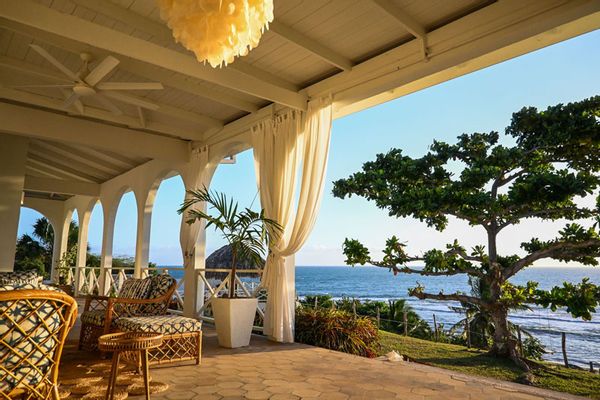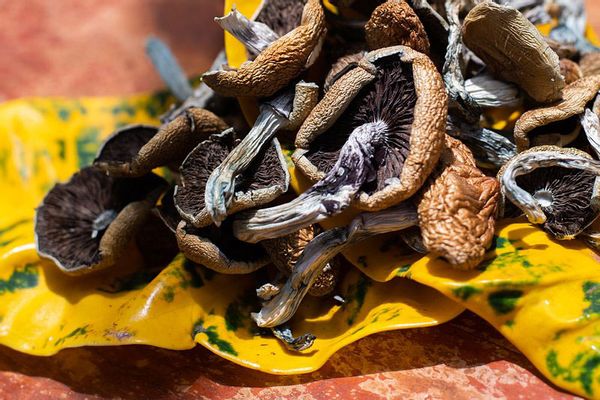Magic mushroom retreat centers can offer healing — but their lack of regulation can carry risks
Navy veteran Justin’s third and final dose of psilocybin, the psychedelic drug found in “magic’ mushrooms, at a retreat center in Jamaica took him back to his time in Iraq. Although his body was physically sitting in a group therapy circle, in his mind he was standing between the enemy and his crew of 460 sailors. It was his duty to protect them, and he felt his body begin to physically absorb the sailors’ fear. It was heavy, all of that fear, so much so that at one point he said he nearly started hyperventilating.
But then, after decades of holding onto this baggage from the war that was causing his body to be in a constant state of fight or flight — he released it.
“What that made me realize was that I never put that pack down, and once I came to terms with the fact that they’re safe, and I don’t have to protect them anymore, I literally felt like there was a pack that came off my shoulders,” Justin told Salon in a phone interview. (Justin asked to be identified only by his first name.)
“There was a therapist there that had her hand on my shoulder, and she said, ‘I felt like something was coming off your shoulder,'” he said.
“I wanted to really heal and not just cover up the symptoms.”
During and after 20 years in the Navy and a ground tour in Iraq, Justin started getting set off by triggering things that would cause him to get rapidly anxious and upset. He has been dealing with post-traumatic stress disorder (PTSD) symptoms for more than a decade and started taking antidepressants in 2018. After he was diagnosed with stage four lung cancer in 2021, he went through a “merry-go-round” of antidepressants to find one that was compatible with his new cancer therapies, but he still felt like all of these different medications weren’t doing enough to address the underlying reasons he was feeling this way, he said.
“I wanted to get off the medication,” he said. “I wanted to really heal and not just cover up the symptoms.”
In his search for alternative treatments, Justin came across MycoMeditations, a retreat center in Jamaica that, according to its website, offers “psilocybin-assisted retreats for people who have tried it all and are ready to heal.” It’s one of hundreds of psychedelic retreat centers that have popped up around the world in what, along with a new wave of research testing how these substances can be used to treat mental health conditions, some are calling the “psychedelic renaissance.
Want more health and science stories in your inbox? Subscribe to Salon’s weekly newsletter Lab Notes.
“We are anticipating quite a revolutionary change in how mental health is treated,” said MycoMeditations CEO Justin Townshend. “Psychedelics for mental health are going to make a substantial change over the next few years.”
More than half of participants in a 2008 study said a single dose of psilocybin was in the top five most personally and spiritually meaningful experiences of their lives.
About 8% of the U.S. population has depression and 30% has anxiety, and those numbers are on the rise. Yet mental health treatments have notoriously lagged behind need, with few new options in the pipeline since selective serotonin reuptake inhibitors (SSRIs) were introduced in the ’80s. In 2019, the Johns Hopkins Psychedelic Research Unit was created to conduct pivotal research testing in the field, and revitalizing a body of research stretching back to the 1950s showing psychedelics can improve depression, PTSD and heavy drinking. Earlier this month, the largest study on naturalistic psilocybin use to date showed participants had significantly improved anxiety, depression and spiritual well-being.
 (Photo courtesy of MycoMeditations)
(Photo courtesy of MycoMeditations)
Psilocybin changes the pathways that regions of the brain use to communicate, and it can cause mystical experiences that are deeply moving. In one 2008 study of people who had never tried psilocybin before, more than half of the participants said a single dose was in the top five most personally and spiritually meaningful experiences of their lives.
Although the Federal Drug Administration (FDA) could approve psilocybin and other psychedelics in the near future, it is still a controlled substance in most U.S. states. Oregon, for example, began rolling out psilocybin therapy services this year, though some have criticized these clinics for being extremely expensive, with some sessions costing as much as $2,800. Because of this, many are traveling to psychedelic retreat centers in countries like Mexico, Costa Rica and Jamaica where psilocybin, but also substances like LSD, MDMA, ibogaine and ayahuasca are allowed.
“In the early days of the retreat business, it really was more like the wild, wild west.”
Using psilocybin isn’t without risks. Psychedelics are not recommended for people with certain cardiac or psychiatric conditions, and they can trigger psychosis in people who have predispositions for mental illness. The American Psychiatric Association doesn’t recommend them outside of investigational studies. Anecdotally, there have been reports of violence and sexual assault during or following psychedelic retreats, where participants are often in vulnerable states when under the influence of psychedelics. Townshend was hired at MycoMeditations in 2019 after the founder stepped down due to misconduct allegations.
Since then, they have changed their model to more of a Western approach drawing from John Hopkins’ protocol, he said. Guests must pass a screening before being accepted and the center is staffed with therapists and various doses throughout the week are broken up with integration days, during which the prior trips can be processed. There are one-on-one and group therapy sessions, and retreats last a week.
 (Photo courtesy of MycoMeditations)
(Photo courtesy of MycoMeditations)
“What we have today is a very different model,” he said. “Back then there weren’t therapists. There weren’t really protocols. In the early days of the retreat business, it really was more like the wild, wild west.”
While many retreat centers base their protocols on what’s done at Johns Hopkins or the Multidisciplinary Association for Psychedelic Studies (MAPS), they vary highly in their approaches. Some may be founded on shamanic practices or wellness ideals rather than Westernized medicine. It’s basically up to consumers to research these places and ensure they’re getting something legit and that suits their personal preference, said Matthew Johnson, Ph.D., a Johns Hopkins Medicine psychiatry professor studying psychedelics.
“Because it is in this world where there’s minimal or no regulations, people are sort of on their own to figure that out.”
“It wouldn’t surprise me that there are retreat centers that are doing things very much like the research that I and others have conducted in the field where there are appropriate safety checks, screening, monitoring and keeping that strong rapport with good professional boundaries,” Johnson told Salon in a phone call. “But because it is in this world where there’s minimal or no regulations, people are sort of on their own to figure that out.”
Some raise additional concerns that profits made in this industry are exploiting Indigenous cultures, who have been using these substances for medicinal purposes and cultural celebrations for 3,000 years. The Oregon Psilocybin Advisory Board’s evidence review, for example, acknowledged that it excluded the “meaningful experiences, knowledge, and wisdom from Indigenous peoples.”
In San Jose del Pacifico in Oaxaca, Mexico, some locals say they now struggle to find specific mushroom species because there has been such a spike in psychedelic tourism, said Osiris Sinuhé González Romero, Ph.D., an archaeologist who studies psychedelics, the history of medicine and Indigenous knowledge at the University of Saskatchewan. Some centers, including MycoMediations, grow their own supply.
“The ethics are very important and sometimes overlooked in the psychedelic renaissance,” Romero told Salon in a phone interview. “It’s necessary to be very careful, and hopefully, in the future, people interested in developing these retreat centers take into account Indigenous knowledge and the different cultural uses to achieve better quality services.”
Nevertheless, it seems like there is a growing demand for people who want to try psychedelics even if they have not been officially FDA-approved. One report projected the psychedelic therapeutic industry to be worth $8.3 billion by 2028. And, as one study in a harm reduction journal put it: “Therapists therefore have an ethical duty to meet this need by providing support for clients using psychedelics.”
Gwen Ingram-Jones, a Licensed Marriage and Family Therapist based in Seattle, said she’s worked with 270 people at MycoMeditations over the past few years. Although the degree of transformation varies from person to person, but they occur more often than not, Ingram-Jones said. For example, one guest who had lost a child experienced the sensation of walking through Hell after taking psilocybin. Ultimately, he got the chance to meet the daughter he had lost and take her home. Then, he felt her make a home within him, bouncing around all of the different corners of his body to turn on the lights.
“I would say that is not an out-of-the-ordinary experience,” Ingram-Jones said. “His personal story is unique to him, but people find transformation like that on a really regular basis.”
In an in-house survey MycoMeditations conducted that was not published in a scientific journal, some guests reported improved symptoms with PTSD. On their website, they also report improvements in depression, a sense of connectedness and well-being among guests after attending the retreat.
For Justin, the veteran, each dose of psilocybin at the retreat helped him peel away a layer that was standing in the way of healing. The first dose helped him process childhood experiences that prevented him from being conscious of and processing his emotions. The next one helped him understand that his anxiety was stemming from PTSD and be more mindful when those feelings came up, he said.
“Sometimes, I catch myself tensing up,” Justin said. “I never noticed that before, but now I notice that and I tell myself to relax.”
“I’m safe,” he said. “I can relax.”
Read more
about psychedelics

